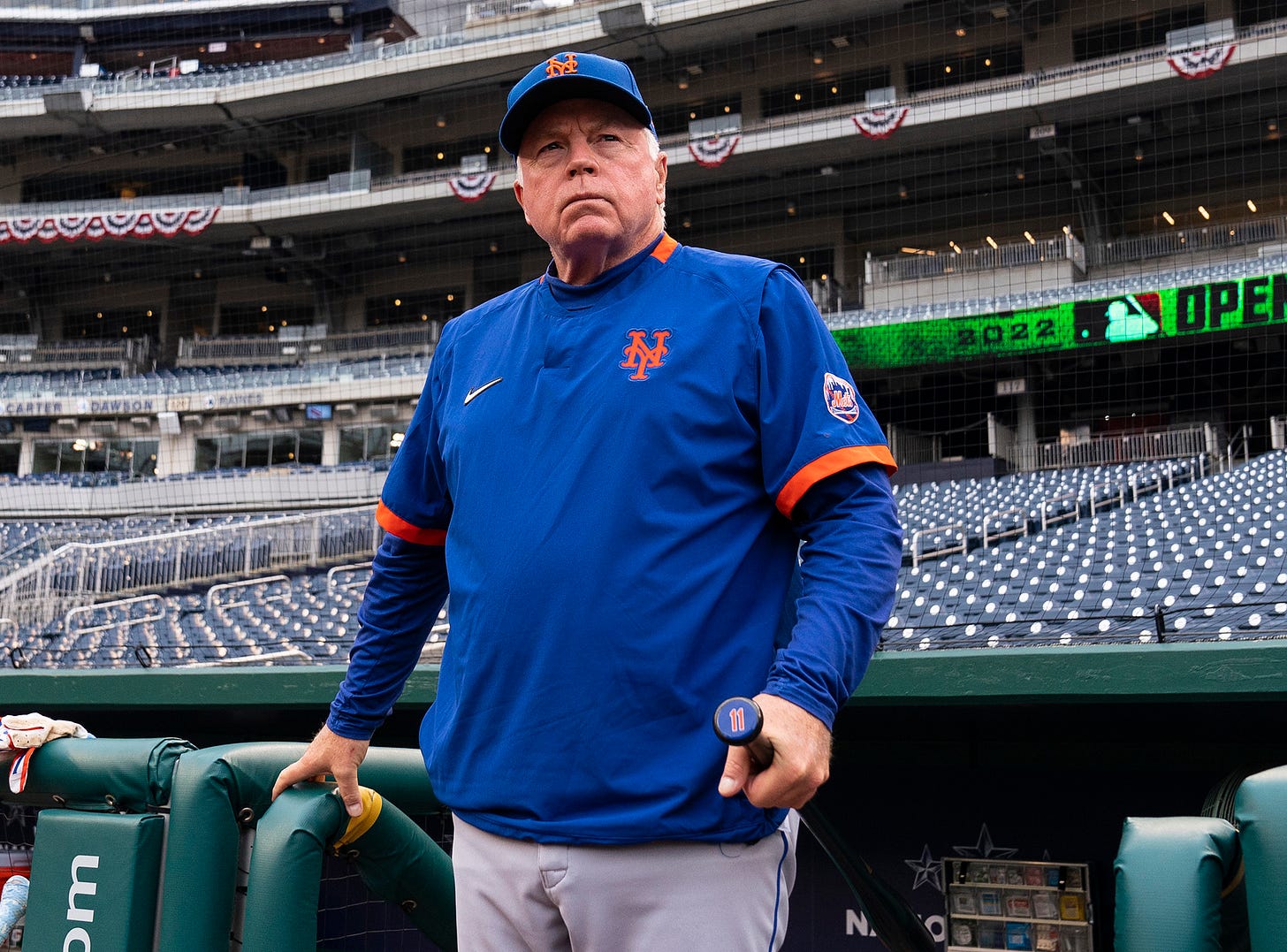The investment in Buck Showalter's compulsive obsessiveness for detail is paying off
In a singular moment, the Mets manager showed his worth on Sunday
During Sunday’s 5-0 win over the Diamondbacks, the Mets pulled off one of the most extraordinary plays in the game following an ordinary sixth inning sacrifice fly from James McCann.
Perhaps the circumstance is poorly described as a play, and better described as cleverness to exploit a loophole in the rulebook on the part of Buck Showalter and the Mets.
With Dominic Smith on third base, McCann hit a sacrifice fly to left field. Smith tagged and scored (another good, aggressive send on the part of third base coach Joey Cora, by the way) to extend the Mets lead to 3-0.
Arizona manager Torey Lovullo called for an appeal play, believing Smith left third base too early (replays showed he did not).
That’s when Showalter pulled the rabbit out of his hat.
With JD Davis still on first base following an RBI single, Showalter signaled to Cora to send Davis. So Davis then took off for second base as Diamondbacks LHP Oliver Pérez stepped off the mound to initiate the appeal at third. Confused, Pérez charged Davis in between first and second, then turned to third base and threw to attempt to complete the appeal.
The problem for Pérez and the Diamondbacks was, by rule, as soon as he chose to pursue Davis, the appeal was negated whether Arizona was right or not.
Davis was credited with a stolen base on the play.
“It’s something we talked about in the spring. We go over a couple of rules every day,” Showalter said after the game. “We couldn’t get the phone call quite in time to make sure we hadn’t left early. So it’s something we talked about. I gave the sign to [third-base coach Joey Cora], and we took off from first base so we could get the run.”
Who knew? Buck Showalter sure did.
“Buck takes great pride in having his players know the rules and one of the loopholes in that rule,” Davis explained afterwards. “We talked about that in spring training if the opportunity came up. If there was an appeal process and a guy on first base, that he would take off early as a way to distract the pitcher from continuing the appeal.”
Showalter was seen giving Davis a thumbs up after he successfully deked Pérez, and subsequently stole second base.
“I’ll trade the out for the run every time,” Showalter said.
As it turned out, Showalter got the run anyway and would have regardless since Smith left third after the ball was caught. He ultimately didn’t have to sacrifice the out to get it. But not knowing for sure at the time, he went for it and made sure the run would score. His shrewd cleverness threw everyone for a loop on the field, in the stands, and maybe everyone in the Diamondbacks dugout as well.
Even the umpires appeared to be flummoxed for a moment by what Showalter and the Mets had pulled off.
Showalter arrived to the Mets as a bullnosed unicorn endeavoring to change the way the Mets not only play the game, but see and think about the game as well. While Showalter’s mileage on his managerial odometer was critical for the Mets in the hiring process, it might not be the biggest reason he is here. Plenty of managers come with experience like Tony LaRussa, Dusty Baker, Joe Girardi and others. And with those examples come a resume full of successful runs through the playoffs as players, managers or both.
But what makes Showalter unique (not necessarily better, of course) is his compulsive obsessiveness for detail and an emphasis on the littlest of little things.
As we all know, baseball is a game of inches and little things.
Yes, experience unquestionably played a role in Showalter’s ability to take advantage of this loophole he exploited on Sunday. But experience wasn’t what was needed to pull this play off. Rather, shrewdness, competitiveness, unique baseball acumen and knowing full well it would work because nobody knew the rule were all the keys to the success of this play.
This alone served as standout proof for why the Mets needed to invest in Showalter. Because the return on investment on the field is higher than that from anyone else who might’ve been available to them this past winter.
Yes, Showalter can be controversial with his moves at times, and they don’t always work out. Not everybody loves him, either. That goes for any manager. But with Showalter, such moves - on full display with the loophole he exploited on Sunday - are clearly all in an effort to gain the upper hand from moment-to-moment and win those moments because he believes winning moments lead to winning games.
It was Showalter who said in spring training he wasn’t a fan of rah-rah speeches and banners, and instead would opt to display a sign in the clubhouse that said, “play better.” But in order to play better, they needed to play smarter and make better decisions in order to net better results.
And that’s precisely what transpired when the Mets successfully exploited this loophole.
This play on Sunday was merely an insurance run as the Mets were on their way to a series win against the Diamondbacks. In the end, it will appear as a footnote in the boxscore. But it was perhaps the highlight moment of the day and served as a microscope into Showalter’s head and how he sees baseball. There will be more moments like this that unfold during the Showalter era, all of which are designed to gain even the slightest of edges and that which experience alone isn’t enough to provide.







Joey Cora has been excellent at 3B. Love a 3B coach being aggressive. Disarcina would constantly hold guys which would be infuriating since the Mets always had trouble scoring runs.